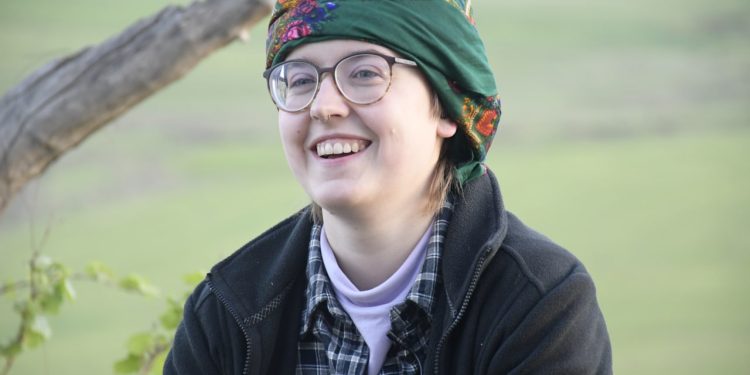NEWS CENTER – Helîn Hevî has responded to the call of the labor brigades and has been in Rojava for two months as part of the internationalist delegation. You are researching the role of youth in the revolution in Rojava and have spoken to many young people who play an active role in the revolution.
Helîn Hêvî spoke to our news agency about her experiences and made it clear that she gained a lot of insights from the work, especially for herself. She gives a comprehensive insight into what prevented her from taking more concrete steps in Germany and what the discussions with the young people in Rojava triggered in her.
She explained the following to our news agency:
“I’m Helin, I’m from Germany. In Germany I was looking for an answer to the problems I see in society. That’s why I started studying social sciences, that’s why I was active in various political groups. At the beginning of the time when I politicized myself on the left, I had a very precise picture of how I imagine left-wing people, imagine left-wing organization and was then quickly surprised that the left-wing scene did not correspond to this picture. Solidarity with each other, helping each other, respecting and yes, loving each other somewhere.
I then got to know the Kurdish movement, in which I found these things much more. Especially with the friends from the Kurdish movement, where I saw that these things are lived. That got me on the path here, even though it took me a long time to get here.
I came to north-east Syria for a research project on young people. To organized youth in revolutionary movements. The research project should offer a perspective for young people in Europe, for organizing, to build a liberated society and thus also give hope. But really feeling what it actually means to be organized in a revolutionary way, to have hope, to have youth spirit, I only noticed here. Although I already spoke about it when I was in Germany. You can say that I got to know the Kurdish movement and somewhere I understood that there is something that can give us hope. But I couldn’t feel that.
For a few weeks now we have been interviewing many young people from different structures and hearing their stories, why are they staying here in a region that has been at war for years, why are they organized, why are they fighting for their society and what is that actually about for a dream of a society they pursue. That’s when I really started to feel hope.
Before I came here I felt kind of dead. So not really alive. It’s been super hard to feel happiness even though I’ve been surrounding myself with the same friends I’m here with now. Simply because I was totally lost in who I am, what the purpose of my life is, what the purpose of political organizing is, and I just wasn’t able to find any hope anywhere.
But I’ve only been here for almost two months and live with quite a handful of friends. We’re trying to build community life, and of course that’s far from perfect. We have many problems and conflicts, but so much has changed in me in this short time. I haven’t been happier here in a very, very long time. That’s why I’m very grateful.
But still, things haven’t been going well for me in Europe for a long time and I couldn’t really pinpoint what the problem was. Despite the things I learned through the Kurdish movement, I never fully understood why things were so bad for me in Germany and when I came here I realized that it was because I – and I think many people feel it Young people a Germany like that – I tried with one foot a revolutionary, to take a different path than the one the system prescribes. So building a liberated society, changing myself, changing the people around me. And with the other leg I stood firm in my liberal life. With the individualism, with the egoism that goes with it, and that became clear to me shockingly quickly when I arrived here. It was evident very quickly.
Instead, I learned here to analyze the problems and to find a common way out of them. A lot of things just resolved themselves because I noticed that living in a community like this automatically makes you feel better.
And the many encounters with the revolutionary young people here also gave a great understanding of what it actually means to take on responsibility. For the people around me, but also for all of humanity. That showed me what this pioneering role of young people actually means. I could really see that in these young people here and use them as a role model for myself.
The youth in Europe should dare to be aware of what it actually means to grow up in capitalism, which we all want to fight and see that the vast majority of reasons we take for not coming to Rojava, not to north-east Syria to come, are actually excuses that spring directly from growing up out of capitalism. As part of this revolutionary practice that we need to develop for this, it should definitely be coming here.”




